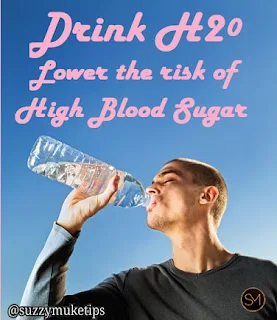According
to Several Studies, Keeping Your Body Well Hydrated May Lower the Risk of
Hyperglycemia
Blood sugar levels or blood glucose levels are a measurement designed
to reveal the amount of glucose in the blood stream.
What is hyperglycemia? It’s a
term meaning high blood sugar.
What is hypoglycemia? It’s used
to refer to when someone’s blood sugar level drops too low.
Did you know that drinking water is an effective way to lower
blood sugar levels? Water helps dilute the amount of glucose (sugar) in your
blood stream. Hydrating your body with lots of water helps decrease your blood
sugar and indirectly reduce insulin resistance and hunger.
Research
results on drinking water and hyperglycemia
French researchers who studied various ways to lower the risk
of high blood sugar reported that drinking about 5 to 8- glasses of water each
day may protect you from the risk of developing high blood sugar (hyperglycemia).
3,615 men and women with regular blood sugar levels
participated in the study. The group that drank more than 34 ounces of water per
day were 21% less likely to develop hyperglycemia in nine years, unlike
the group that drank 16 ounces or less a day.
According to analysis from these researchers, other factors that
can impact high blood sugar risks such as sex, weight, age, physical activity, alcohol,
wine and sugary drinks were also considered.
Did you know that there is prediabetes? Up to 79 million
Americans live with it. According to the CDC, this is when a person has a
higher than normal blood sugar levels but not enough to be diagnosed with
diabetes. Prediabtes raises your risk of ending up with severe conditions such
as type 2 diabetes, heart disease, and stroke.
The Connection
Between Water and Hyperglycemia
According to research studies conducted recently, there is a
link between the hormone vasopressin (regulates water in the body) and
diabetes.
It’s well known that drinking adequate water helps with vasopressin
secretion. However, no comprehensive study has been conducted to ascertain the
connection between hydration with water and the risk of high blood sugar, explains
scientists.
Cases
developed during the study
Before the study came to a close, 565 people developed high
blood sugar.
According to James R Gavin III, MD, PhD, clinical professor
of medicine at Emory University School of Medicine in Atlanta, more basic
research studies on the association between drinking water and hyperglycemia need
to be done.
Gavin says failing to drink adequate water could be similar
to what happens to those who consume a lot of cholesterol. Know that Gavin also
doubles as chair of the Partnership for a Healthier America, an initiative
charged with combating obesity in children.
If you consume food that has too much cholesterol and
fat, it may render you more vulnerable to type 2 diabetes. This can lead
to the development of atherosclerosis or cause arteries to harden.
Besides, he also points out, "Insufficient fluid intake may also influence
susceptibility to diabetes.”
Why
drinking water is particularly important
Drinking water helps to flush out surplus glucose. Water
keeps everyone feeling fuller. It is a healthy option away from snacks and
fizzy drinks.
Drinking fresh filtered water from the tap is not only okay
but also easily available.
Always remember to refresh your body with lots of water as it
reduces the effect of excess calories such as tiredness and headaches.
Now you know that you must not wait for thirst to push you
before you can reach for that drinking water in your car, office or wherever
you spend your days.
















0 Comments